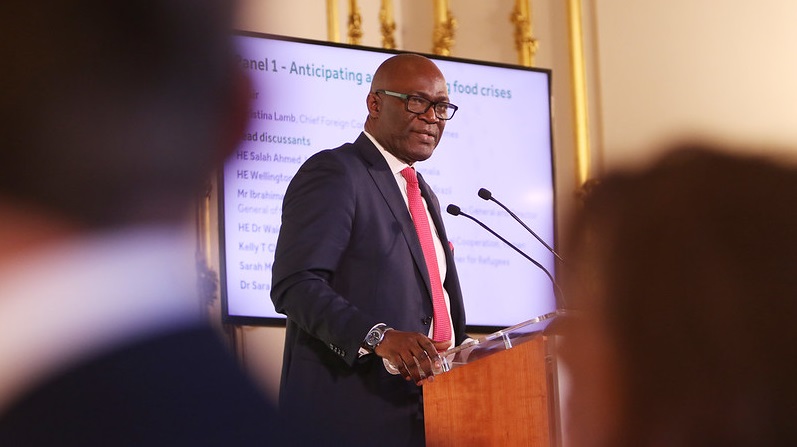Governments have chosen veteran Senegalese banker Ibrahima Cheikh Diong to lead the new United Nations’ fund for responding to the loss and damage caused by climate change.
The government officials who make up the fund’s board selected Diong – who has worked in insurance, private and public banks and government – during a meeting in Azerbaijan’s capital Baku last week. His appointment was announced on Saturday.
The board’s co-chair Richard Sherman said the selection “reflects the seriousness of the multilateral resolve to address the urgent impacts of loss and damage in countries that are particularly vulnerable to the adverse effects of climate change”.
Diong, who also has American nationality, said he was “honoured” to take up the role and looked forward to providing “crucial support to low-income developing countries most affected by climate change”.
Global push to triple renewables requires responsible mining of minerals
Diong’s career spans China, the United States, the UK and much of Africa and the Arab world. He is fluent in English, French, Mandarin and Wolof.
He has long experience in raising money for infrastructure projects – including airports and power plants – in Senegal, and has more recently led efforts to expand insurance for climate disasters in Africa and advised governments on how to deal with and prevent them.
Globe-trotting career
As a young man in the 1980s, Diong studied civil engineering at Hohai University in the Chinese city of Nanjing, writing a thesis on the design of a hydropower dam on the Wuhan river.
In 1989, he returned to Senegal to design projects to improve access to drinking water and irrigation in rural areas. From 1993, he worked as a freelance management consultant before joining consulting firm Booz Allen Hamilton in Virginia.
In the early 2000s, he worked for the World Bank, the organisation that has been selected to host the loss and damage fund on an interim basis, despite some resistance from civil society and developing countries.
In 2007, Diong became an adviser to the president of Senegal on the country’s relationship with China and raising funds for investment from emerging markets.
COP29 aims to boost battery storage and grids for renewables, as pledges proliferate
According to his LinkedIn profile, he also worked with Senegal’s infrastructure minister on development and fundraising for large projects including a new airport and coordinated the establishment of Senegal Airlines, a publicly-owned airline which quickly folded after accumulating too much debt.
In 2011, he spent six months as permanent secretary at the energy ministry and tried to tackle the country’s energy crisis by boosting supply through building new power plants and rehabilitating old ones.
He then moved to London to become senior Africa banker with French bank BNP Paribas, raising finance for key infrastructure projects, including power plants, roads and convention centres.
After another spell as a consultant, the United Nations appointed Diong to lead the African Risk Capacity (ARC) group in 2020. The ARC arranges insurance against extreme weather for African countries and advises governments on how to prepare for and respond to severe droughts, floods and storms.
Developing countries denounce rich nations’ disregard for just transition talks
Diong left ARC about a month ago to take up a role as an adviser on environmental, social and governance issues to the president of the Arab Bank for Economic Development in Africa. The bank is co-owned by 18 Arab countries, and channels money to African nations for development projects as well as financing Arab exports and investments to the continent.
In a video with farewell messages posted a month ago on Youtube, Diong’s former employees at ARC describe him as humble, inspirational and a good singer of ‘Wonderful World’ by Louis Armstrong. “We have been doing loss and damage since before loss and damage became mainstream,” says one.
Diong will take up his role with the Fund for responding to Loss and Damage (FRLD) on November 1, with the fund likely to start distributing money for the first projects it approves next year.
A former member of the fund’s transitional board, Avinash Persaud, said he wished Diong well but feared the fund “will remain tiny”. At COP28 last year, wealthy governments pledged around $660 million to the fund and no further announcements have been made since.
The Azerbaijan government, which hosted last week’s FRLD board meeting, said it would work at November’s COP29 UN climate summit to convert the pledges received so far into tangible funding ready for disbursement “to the communities who particularly need it”, and seek further contributions to the fund.
UK calls for “ambition” on COP29 climate finance goal but won’t talk numbers
Persaud said he feared too many people still think that one of the main solutions to loss and damage is that those at risk should take out more insurance, despite insurers becoming increasingly reluctant to provide cover against climate-related catastrophes.
The finance expert from Barbados added that, rather than relying on wealthy countries to pledge money to the fund, a “systemic global mechanism” is needed to fill it more reliably, such as a tax on oil production.
Correction 23/9/2024: This article originally incorrectly stated that Avinash Persaud was a member of the fund’s board. It has been corrected to say that he is a former member of the fund’s transitional board.
(Reporting by Joe Lo; editing by Megan Rowling)
